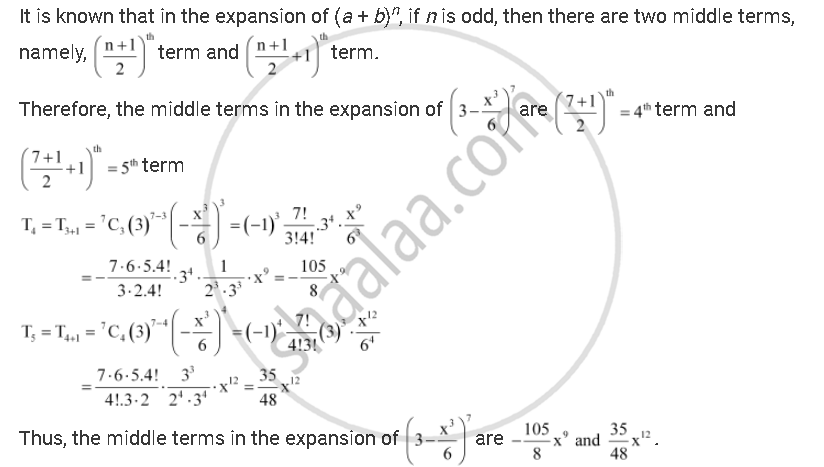Advertisements
Advertisements
प्रश्न
Find the middle terms in the expansions of `(3 - x^3/6)^7`
उत्तर

APPEARS IN
संबंधित प्रश्न
Find n, if the ratio of the fifth term from the beginning to the fifth term from the end in the expansion of `(root4 2 + 1/ root4 3)^n " is " sqrt6 : 1`
Find the middle term in the expansion of:
(iv) \[\left( \frac{x}{a} - \frac{a}{x} \right)^{10}\]
Find the middle terms in the expansion of:
(iii) \[\left( 3x - \frac{2}{x^2} \right)^{15}\]
Find the middle terms(s) in the expansion of:
(i) \[\left( x - \frac{1}{x} \right)^{10}\]
Find the middle terms(s) in the expansion of:
(iii) \[\left( 1 + 3x + 3 x^2 + x^3 \right)^{2n}\]
Find the middle terms(s) in the expansion of:
(x) \[\left( \frac{x}{a} - \frac{a}{x} \right)^{10}\]
Find the term independent of x in the expansion of the expression:
(iii) \[\left( 2 x^2 - \frac{3}{x^3} \right)^{25}\]
If the coefficients of \[\left( 2r + 4 \right)\text{ th and } \left( r - 2 \right)\] th terms in the expansion of \[\left( 1 + x \right)^{18}\] are equal, find r.
If the coefficients of (2r + 1)th term and (r + 2)th term in the expansion of (1 + x)43 are equal, find r.
If the coefficients of 2nd, 3rd and 4th terms in the expansion of (1 + x)2n are in A.P., show that \[2 n^2 - 9n + 7 = 0\]
Find the coefficient of a4 in the product (1 + 2a)4 (2 − a)5 using binomial theorem.
If in the expansion of (1 + x)n, the coefficients of three consecutive terms are 56, 70 and 56, then find n and the position of the terms of these coefficients.
If 3rd, 4th 5th and 6th terms in the expansion of (x + a)n be respectively a, b, c and d, prove that `(b^2 - ac)/(c^2 - bd) = (5a)/(3c)`.
If a, b, c and d in any binomial expansion be the 6th, 7th, 8th and 9th terms respectively, then prove that \[\frac{b^2 - ac}{c^2 - bd} = \frac{4a}{3c}\].
Write the middle term in the expansion of \[\left( x + \frac{1}{x} \right)^{10}\]
Write the coefficient of the middle term in the expansion of \[\left( 1 + x \right)^{2n}\] .
Write the total number of terms in the expansion of \[\left( x + a \right)^{100} + \left( x - a \right)^{100}\] .
If A and B are the sums of odd and even terms respectively in the expansion of (x + a)n, then (x + a)2n − (x − a)2n is equal to
The number of irrational terms in the expansion of \[\left( 4^{1/5} + 7^{1/10} \right)^{45}\] is
If in the expansion of \[\left( x^4 - \frac{1}{x^3} \right)^{15}\] , \[x^{- 17}\] occurs in rth term, then
In the expansion of \[\left( x - \frac{1}{3 x^2} \right)^9\] , the term independent of x is
If in the expansion of (1 + y)n, the coefficients of 5th, 6th and 7th terms are in A.P., then nis equal to
If rth term is the middle term in the expansion of \[\left( x^2 - \frac{1}{2x} \right)^{20}\] then \[\left( r + 3 \right)^{th}\] term is
Find the middle term in the expansion of `(2ax - b/x^2)^12`.
Find numerically the greatest term in the expansion of (2 + 3x)9, where x = `3/2`.
If the term free from x in the expansion of `(sqrt(x) - k/x^2)^10` is 405, find the value of k.
Find the term independent of x in the expansion of `(3x - 2/x^2)^15`
Find the middle term (terms) in the expansion of `(3x - x^3/6)^9`
If p is a real number and if the middle term in the expansion of `(p/2 + 2)^8` is 1120, find p.
The number of terms in the expansion of [(2x + y3)4]7 is 8.
The sum of coefficients of the two middle terms in the expansion of (1 + x)2n–1 is equal to 2n–1Cn.
The last two digits of the numbers 3400 are 01.
If the expansion of `(x - 1/x^2)^(2n)` contains a term independent of x, then n is a multiple of 2.
The coefficient of x256 in the expansion of (1 – x)101(x2 + x + 1)100 is ______.
The sum of the co-efficients of all even degree terms in x in the expansion of `(x + sqrt(x^3 - 1))^6 + (x - sqrt(x^3 - 1))^6, (x > 1)` is equal to ______.
If the 4th term in the expansion of `(ax + 1/x)^n` is `5/2` then the values of a and n respectively are ______.
The coefficient of y49 in (y – 1)(y – 3)(y – 5) ...... (y – 99) is ______.
If the coefficient of x10 in the binomial expansion of `(sqrt(x)/5^(1/4) + sqrt(5)/x^(1/3))^60` is 5kl, where l, k ∈ N and l is coprime to 5, then k is equal to ______.
